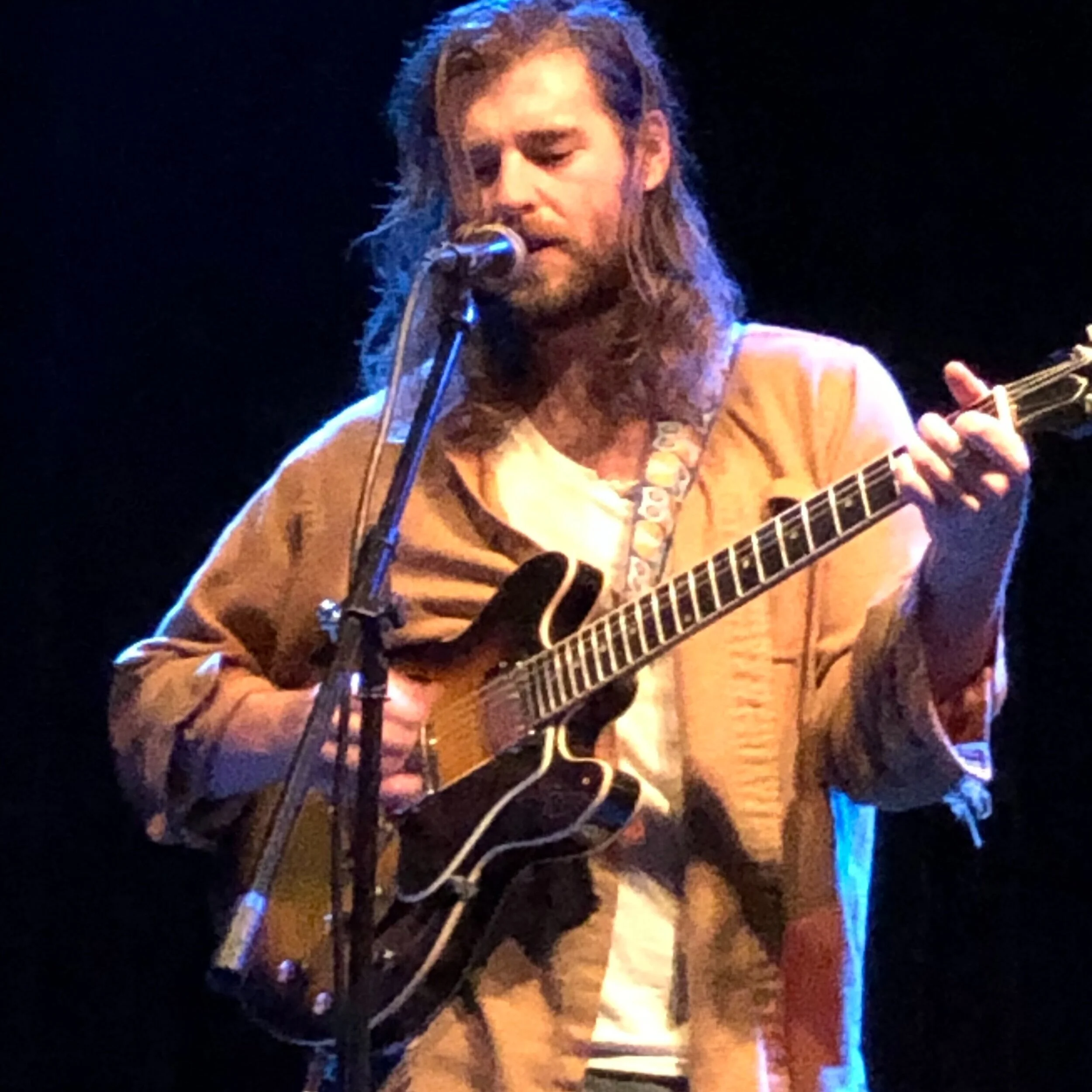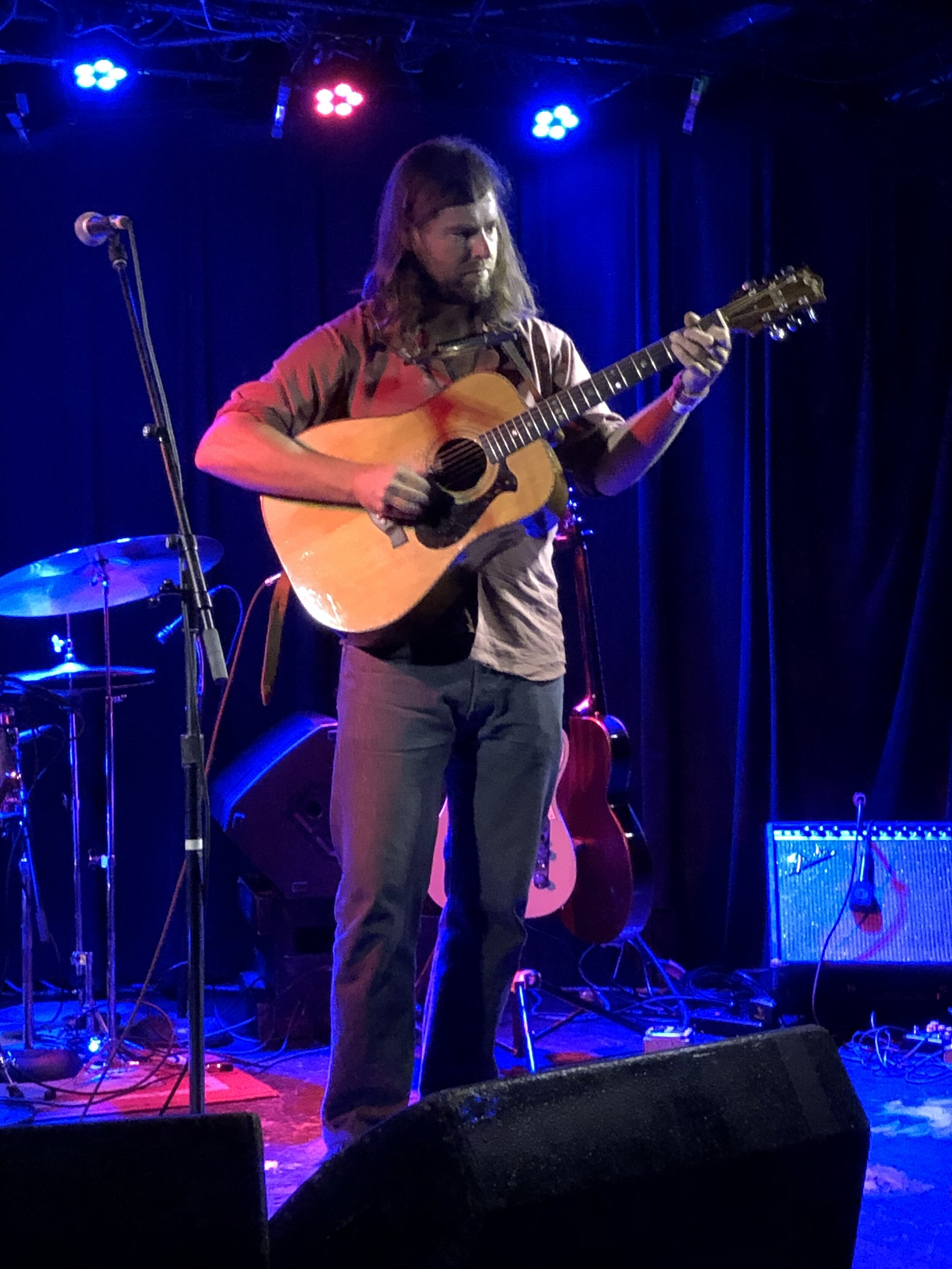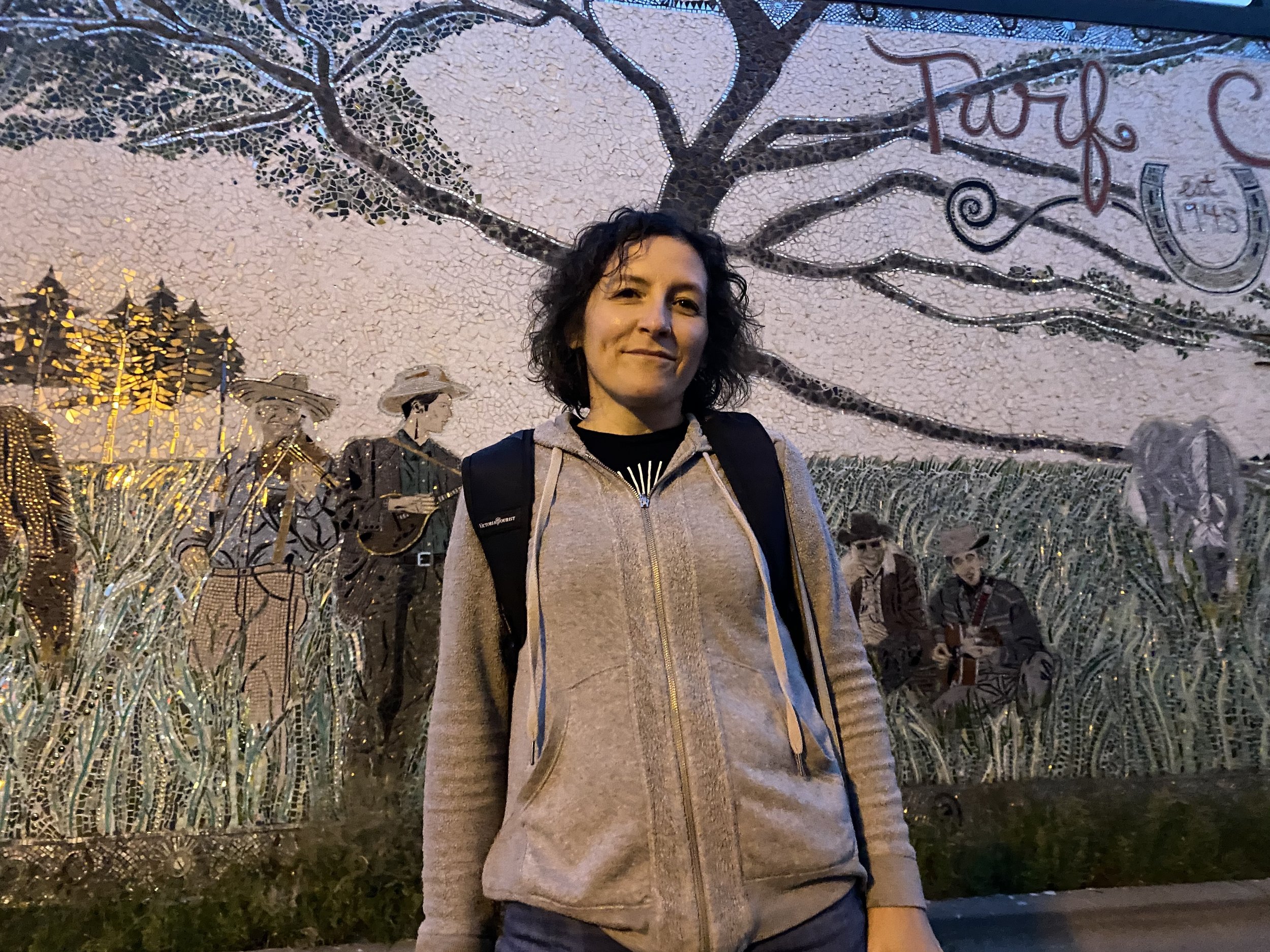Virtual Listening Party: Luke Callen
A song-by-song exploration of Luke Callen’s new release, Hard Sardine
I first encountered Luke Callen at the 2019 Great River Folk Festival in La Crosse, Wisconsin. I was watching a song swap between a few artists, including one of my favorites, Charlie Parr. When Parr performs, everyone else fades into the background for me, so it was remarkable that Callen’s music caught my ear. But his signature fingerpicking style and big, powerful voice—so unlike his mellow stage presence—made me sit up and take notice.
Up until then, music had played a soothing, escapist role in my life—I went to it for a break from the protesting, worrying and grieving that had consumed my life even more since a certain twice-impeached, now ex-president had entered the political landscape.
Callen’s music is not escapist. He’s a folk singer whose protest songs pack a wallop, often digging into big topics like racial injustice with visceral anger and pain. That made it even more surprising how much I was drawn to his music. It marked a turning-point in the role music played for me; I still use it to escape, but I also love when it speaks directly to the problems we face.
In Callen’s new release, Hard Sardine, he’s still keenly attuned to injustice and suffering. But while he tackles some heavy topics, his music never drags. He’s the kind of artist whose songs you can enjoy just for the sound, allowing yourself to be carried along by his impressive playing and one-of-a-kind voice (and the talented backing musicians he assembled for the album), or you can be alternately moved and intrigued by his thought-provoking lyrics.
In that spirit, I wanted to give each track its own due in my review, and Callen graciously agreed to share his own thoughts on the songs. I’ve linked to each one on YouTube so you can listen along as you read!
I call this song my favorite Twin Cities diss track, and it’s a great introduction to Callen’s habit of pairing laid-back grooves with cutting lyrics. In it, he lays out the disappointment of relocating to an area with a proud reputation as a progressive, nature-loving haven—and discovering it has the same problems as anywhere in America: “I guess here it ain’t no different, it’s all stolen land / anywhere I walk I got the blood on my hands.” It’s hard to choose a favorite song on the album but this one is close—and wins bonus points for name-checking/quoting Charlie Parr!
Callen’s Take: “This was the first song I wrote after moving to Minneapolis. I've seen the dams up and down the Mississippi River, the pollution, the pipes crisscrossing the river, the no trespassing signs—it keeps me up at night. I took a long walk to the river and when I got there I watched a crane scraping metal from a giant pile onto a conveyor belt. I wrote this song after that walk.”
The opening notes signal another easygoing bop, but instead it’s a nightmare ballad (if that wasn’t a thing, it is now!). Callen’s voice sounds haunted as he pulls you into a dread-filled encounter with a demonic figure (“He’ll take your hand in his hand like some kind of long lost friend / but he won’t tell you where you’re going”).
Callen’s Take: “For the past 11 years I've had this recurring dream of a long winding journey that ends with some sort of meeting with my father—he doesn't recognize me and I wake up with a terrible pain in my heart. I woke up from one of these dreams and the song was written. In my childhood, my father would often mimic the call of a barred owl—that’s where the song title came from.”
Another trademark of Callen’s repertoire is emotionally resonant story songs about usually tragic figures—check out his earlier records for some stellar examples—and this has all the earmarks, as hints emerge of his main character’s lonely life and tough past. She appears to prevail over the final challenge posed in the last verse, but you’re left wondering what will come next.
Callen’s Take: “I walk a lot, oftentimes at night. It’s a privilege my body is afforded. This song is fictional—gathered and imagined from stories I've been told throughout my travels. The main character—strong and unwilling to compromise her existence—is still walking late at night.”
It comes as no surprise that Callen is fiercely anti-capitalist, and he makes some pretty compelling cases in his songs that it’s a losing game for most. This languidly paced song, maybe my favorite on the album, has a lot of layers and room for interpretation, but the theme of money being a threat to humanity comes through unequivocally: “Desperation don’t hesitate on the takin’ / only question it’s asking: why you waiting?”
Callen’s Take: “I was crashing at a friend's house for a few nights. We went out one evening and returned the next morning to find the house broken into. The only thing missing was a large jar of change Matt kept in his room—folkx just trying to get their fix; no harm done. I wrote this the next day from the perspective of the person breaking into the house; I imagined it to be a desperate situation. Flipping a jack and passing the buck around the table is a reference to a game of euchre, which we’d been playing the night before.”
“Sometime in the summer 1938, Mdewakanton land seized by the state…” The opening lines of this song had me doing internet research right away, it was so specific. Sure enough, this is the story of Red Wing, Minnesota, and the ways the land it’s on has been stolen, damaged and exploited over the years. It’s also a great showcase for Callen’s voice, soaring over a backdrop of contemplative electric finger-style guitar.
Callen’s Take: “Every town in America has a story with similar themes to this one. An indigenous people are displaced by the ‘progress’ of brutal colonizers. This particular tragedy happened in modern times to the Mdewakanton people—known today as the Prairie Island Indian Community—who are still surviving despite modern attempts at genocide.”
Unlike the unnamed protagonist of “Nothing to Hold,” the opening lines tell us this main character isn’t going to survive her ordeal: “Big Bill Martin, tell me, what have you done? / You shot poor Ella down with your dirty gun.” The song is a twist on a classic murder-ballad subject based on a real-life 1800s incident. Unlike some retellings that use her story as a cautionary tale, Callen’s version is much more empathetic: “The meanest thing that Ella ever done was go to town and have her lovin fun / But now two little children Ella left behind / in a wicked world, they’re paid no mind.”
Callen’s Take: “Oftentimes I think we sing murder ballads without any understanding of the pain that was caused to write them—and the pain that endures as we repeat them callously. Mine is a rewritten version of this song.”
I think of this as a companion piece of “Refugee” from Callen’s 2019 album below your knows. Both songs revolve around a word that’s used to strip humanity away from large groups of people. In both songs, Callen digs into the individual lives behind the labels. The folks portrayed in “Alien” could very well be based on a tamale vendor and flower seller I’ve seen at the West Bank bar Palmer’s. Callen’s lyrics remind us of the hardships that await immigrants even after they make the tough decision to leave home and the even harder journey: “They got where they’re going, but no one’s asking how they’ve been / They just scream and yell ‘alien.’”
Callen’s Take: “I think it’s wildly absurd that certain folkx call people traveling across made-up borders ‘aliens’—especially when they're standing on stolen land. The hypocrisy is profound and alarming.”
Callen draws on his own experience for this song, reflecting on how different it would’ve been if he weren’t white: “If I was another man I’d’ve been terrified / Too many people seen that face when they die / A white man who thinks he’s king of this land / He’s the judge, the jury and the hangin’ man.”
Callen’s Take: “I wrote this in Milwaukee after getting pulled over by the Kenosha County Police Department. My whole van and everything in it was searched. At the end of it, the cop laughed and said 'some days you win some days you lose—today you guys won.' I thought that was something cops were only supposed to whisper to their partners, but he said it out loud. Then he told us where to get the best kringles. He was a skinhead who was angry—he terrified us—and all we could think about was how this situation only ended a certain way because of our skin color.”
This track is a prime example of how it’s easy to just enjoy the sound of Callen’s songs without delving too deep. Every time it comes on I forget to think about the lyrics, letting the music wash over me instead. It’s a slow burn of a song that gradually gathers intensity, both in the instruments and Callen’s delivery. When I finally managed to focus, I found the lyrics evocative but cryptic, seeming to mourn the loss of land and nature to man’s overuse of resources and tendency toward war: “The sky it was a blanket bed so we got to laying down / But the army came and woke us up there, they were marching out of town.”
Callen’s Take: “I get really pessimistic when I think about our earth and its lifeways and how we're strangling them. I wrote this in that sort of desperate mindset. We use too much and we waste the rest—a horrible combination for any kind of longevity: ‘A kingdom it's been claimed o'er the entire earth / what a sight—last rays of light learning just what it's all worth.’”
This song is always a standout at Callen’s live shows. A departure from his usual story and protest songs, it’s mostly instrumental, a short, lively fingerpicking showcase with only one line of lyrics, which could be seen as poking fun at astrology or just a little reminder that none of us are quite as important as our minds try to tell us we are: “The world don’t turn just so you can see the stars.”
Callen’s Take: “I wrote this for myself and only for myself—if it resonates or makes you feel some type of way about it, that's on you—I am a Scorpio after all. (I know what you're about to say; ‘That makes so much sense!’....Sure.)”
Listen to the full album on YouTube:
Carol Roth is a full-time marketing copywriter and the main music journalist and social media publicist for Adventures in Americana. In addition to studying the guitar and songwriting, Carol’s additional creative side hustle is writing self-proclaimed “trashy” novels under the pseudonym @taberkeley!





